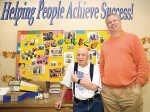Tri-Valley director 'fell in love' with his vocation

When Tim Cunningham was in graduate school in England, majoring in medieval history, he, like many other college students, had no idea what life held in store for him.
Fast forward to the present and Cunningham seems quite satisfied in the direction life has taken him professionally as the executive director of Tri-Valley Developmental Services, an organization with a wide array of support programs for persons with disabilities.
Cunningham received his undergraduate degree from Wichita State University and then attended The University of Durham in Durham, England for graduate study in medieval history.
"I was actually going to get my Ph.D., but I ran out of money, so I started working at Starkey (a developmental services company) in Wichita to save up some money," Cunningham said. "I fell in love with the business and stayed in it. I absolutely love working with the clients. Originally, I was planning on teaching and that was going to be it. I started doing this and loved it. Working with the clients and seeing the progress they make and seeing their successes and their big smiles, those are the enjoyable things."
Cunningham said he had friends who had a couple of kids with Down Syndrome and grew up with two cousins with disabilities.
"When we were growing up I really didn't see their disabilities," Cunningham said "We just played and had fun and I really didn't notice. I kind of grew up around it a little bit."
Cunningham said he worked with three agencies similar to Tri-Valley in Wichita prior to coming here.
"There was an opening here in this area and my wife (Tara Cunningham) didn't tell me about it," Cunningham said. "She works in this field as well. She didn't want to tell me about the job because she didn't want to move from Wichita. After a while she finally decided to tell me; I applied and got it."
He said that after getting the job, he moved to Chanute and Tara stayed in Wichita for a year.
"Then she moved here for three years and just recently moved back to Wichita to work," Cunningham said. "We commute on weekends. We did this for a year before and it worked just fine. I think we talk more now than when we were living in the same house."
Though Cunningham is anchored in Chanute, Tri-Valley serves a wide area, including Bourbon, Allen, Woodson and Neosho counties. He said he tries to make it to Fort Scott at least once a week.
In the five years that Cunningham has been with Tri-Valley, he has seen a number of changes.
"The list of changes we've made is incredible," Cunningham said. "We've added a new quality assurance program, we've completely changed our staff orientation -- we used to do just a couple of days and now we do a full week."
Cunningham said they also has changed staffing patterns and reduced costs.
"I could give you a list 10 pages long of things we have changed," Cunningham said. "I took it a little slow at first, but once I was here awhile we started making big changes. I think one of the big ones was the new quality assurance program because that has really helped."
Cunningham said the quality assurance manager now meets with clients to review how they are doing, visits each of the 20 living sites and service centers at least once a year. She also does file reviews, and site checks to make sure clients have enough food and that they are safe and secure.
"We're trying to be as proactive as possible, versus being reactive," Cunningham said.
He added that Tri-Valley has built two new houses in Fort Scott in the past five years, which house 11 clients. They also have a home that was donated by Winifred Jent where four clients reside.
"We also have people who live in apartments and smaller group homes," Cunningham said.
He added that about 50 people are in Tri-Valley's residential program in Fort Scott.
As much as Cunningham likes his job, he admits it is not without its headaches.
"The one negative about this field is the state does not fund us like they should," Cunningham said. "They are supposed to do a rate study every two years, but they don't, and when they do it, it shows they are not paying us enough. But they don't do anything about it. They just keep cutting and cutting and cutting. We are basically cut to the bone now. We had 255 staff about 10 years ago, now we are down to 152. I still think we do a quality job here because we have become a lot more efficient, but we are probably a couple of million dollars underpaid every single year. And it is going to get worse with managed care."
Cunningham said they are currently making $8,000 (annually) less per staff person than they did back in 1995.
"We also had better staffing patterns, " Cunningham said. "We may have had six clients for one staff member; now we are probably at 10 to one."
He said that in the past a staffer could work one on one with a client to help them learn how to read or acquire math skills.
"We can't do that anymore," Cunningham said. "We do classroom size, so basically now we are trying to maintain skills versus teaching new skills."
